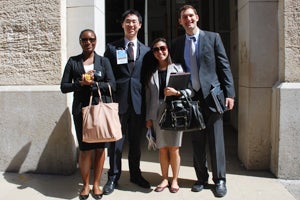Harvard Law School tied for third place at the international finals of the World Trade Organization (WTO) moot court competition. This was HLS’s first year participating in the competition. The simulated hearing, established in 2000 by the European Law Students Association (ELSA), is based on the World Trade Organization (WTO) dispute settlement system. The event, held on May 6-13 in Montpelier, France, involved law students from all over the world, as well as numerous trade law experts and WTO legal officers.
Team members Michael Jacobson ’13, Danielle Bart ’13, Ashley Chung ’12 and Chris Yap ’12 advanced to the international final by winning the North American regional at American University Washington College of Law in Washington D.C. in March.
Qualifying teams from the five regional rounds (North America, South America, Asia-Pacific and two European rounds) competed in the world finals in Montpellier, France.
“The opportunity to travel to Montpellier and meet teams from all over the world was unparalleled,” said Chung. “Although we were all competing against one another during the moots, and the caliber of the competition was outstanding, outside moot court all of the teams were warm, welcoming and truly collegial.”
In addition to the HLS team placing first in the preliminary round, three of the HLS oralists won awards for their performance: Jacobson took first place, Bart placed second and Yap fourth.
HLS won its quarterfinal match-up against Ateneo De Manila Law School Philippines then narrowly lost to the team from the Graduate Institute of International Studies of Geneva, Switzerland. The Graduate Institute went on to win the Grand Finals.
The HLS team and Jindal Global Law School from India came to the mutual decision to share third place, as permitted under WTO dispute settlement rules.
Team member Danielle Bart was awarded the Ieva Zebryte Award for the best oralist in the semifinal round. “More than in any other activity I’ve done at HLS, I was able to fully explore a set of law and policy problems, and interact with students, practitioners and global experts who were doing the same thing,” she said. “Not only that, all of the teams and lawyers we met brought different perspectives to the table. It was incredibly rewarding. The trip to France didn’t hurt either!”
HLS’s WTO Moot Court team was formed by Jacobson in the summer of 2011. After taking Professor Mark Wu’s international trade class last spring, Jacobson researched moot court opportunities and asked Wu to serve as team adviser for the WTO Moot Court competition.
The WTO moot court competition seeks to advance academic understanding of the WTO and its agreements, contribute to the discussion on globalization and trade, and assist in the development of countries’ technical legal capacity through the training of new trade lawyers and negotiators.
